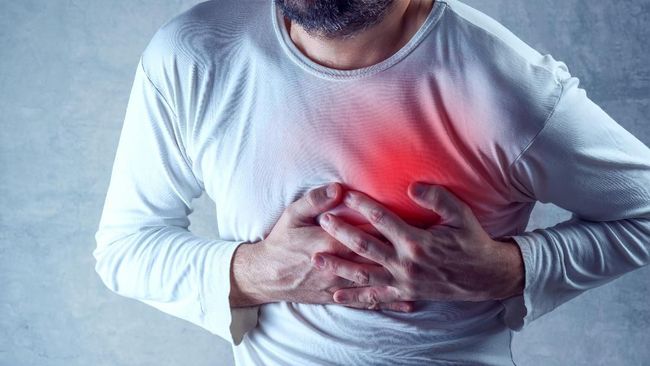Jakarta, CNN Indonesia –
Heart disease can affect anyone regardless of age or gender. Study of a cardiologist Johns Hopkins Community Physicians-Heart Care proves that now the young people are also vulnerable to infection heart disease.
Some of the contributing factors include congenital heart disease, blood pressure high, cholesterol height, and smoking habits.
Here are 7 characteristics of heart disease at a young age with various symptoms, which are summarized from various sources.
1. Chest Pain
|
Foto: Istockphoto/Zinkevych Illustration: Chest pain is a feature of heart disease at a young age.- – |
One of the most common symptoms of heart disease is angina pectoris or chest pain. This symptom comes when the chest feels uncomfortable like something is pressing.
Cause angina pectoris this occurs due to a lack of blood flow to the heart, which affects oxygen intake to the heart.
In addition, angina can also be stable or unstable. Stable chest pain can occur when the sufferer is under high emotional stress or activity.
For unstable chest pain, the process usually occurs suddenly. The pain is usually difficult to control, even with medication.
2. Back, Neck, Arm, Abdominal Pain
Pain in body parts such as back, neck, arms, and stomach can occur in people with heart disease due to angina pectoris whose process is spreading.
Before attacking other parts of the body, angina pectoris first affects the chest, especially the sternum, then moves to the shoulders, arms, back, and stomach.
The reaction that arises from angina when it travels to the neck, such as a burning sensation in the throat.
Meanwhile, abdominal pain occurs because the angina point is in the gut. These symptoms sometimes feel like symptoms of an ulcer.
3. Dizziness
 Illustration: Headache is one of the characteristics of heart disease at a young age. (Photo: lannyboy89 / Pixabay)- Illustration: Headache is one of the characteristics of heart disease at a young age. (Photo: lannyboy89 / Pixabay)-– |
The characteristics of heart disease at a young age are also characterized by headaches or excessive dizziness. This occurs because the heart is unable to pump enough blood to the brain.
The impact of this dizziness makes normal heart rhythm disturbed. Contractions like this are commonly referred to as arrhythmia.
Actually, dizziness can hit anyone due to various factors. However, the dizziness that becomes a symptom of heart disease is different from common.
Heart sufferers can feel dizzy with the intensity of the time often, usually accompanied by pain in other parts of the body. If you feel this way, you need to be alert and immediately check with a doctor.
4. Fatigue
Another characteristic of heart disease is body fatigue. Most sufferers think this happens because of too much activity or lack of sleep.
In fact, fatigue in heart disease is clearly different and easily visible. In general, sufferers will tire easily even though they do not move much.
The cause of fatigue is when the work of the heart is forced to pump harder, while the blood flow is blocked.
If you have experienced excessive fatigue quite often, it is possible that something is wrong with your organs and it is best to get checked out.
5. Cold Sweat
When the blood vessels narrow, a person will experience heart rhythm disturbances and cause it to occur ischemia.
Condition ischemia this triggers excessive sweating due to constriction of blood vessels, so the condition is often called cold sweat.
Cold sweats that are characteristic of heart disease often occur along with other symptoms such as shortness of breath or pain in the body.
Cold sweats accompanied by pain in certain areas can indicate that the body is in serious condition and requires medical attention.
6. Shortness of breath
 Illustration: Shortness of breath is one of the characteristics of heart disease at a young age (Photo: Istockphoto / Catinsyrup)- Illustration: Shortness of breath is one of the characteristics of heart disease at a young age (Photo: Istockphoto / Catinsyrup)-– |
Dyspnea or shortness of breath is also one of the symptoms of heart disease. The sufferer will feel shorter breaths accompanied by chest pain or tightness.
Symptoms of shortness of breath are caused by blocked blood flow to the heart. This has an impact on the way of breathing that becomes shorter than usual.
Shortness of breath for people with heart disease lasts for a few minutes.
However, if the shortness of breath lasts longer, consult a doctor to avoid the risk of sudden cardiac arrest.
7. Nausea and Vomiting
Nausea and vomiting along with chest pain can be an early sign of heart disease. Symptoms like this are more often experienced by men than women.
Nausea and vomiting are the effects of body conditions that produce excessive sweating or cold sweat.
Some cases that experience the characteristics of heart disease with nausea and vomiting can make the sufferer faint.
To avoid fainting, when experiencing nausea and vomiting along with chest pain, you should immediately go to a doctor for an examination.
This characteristic of heart disease at a young age can be avoided early so that the condition does not worsen. However, there’s nothing wrong with taking precautions as early as possible by adopting a healthier lifestyle.
Other efforts that can be done are maintaining ideal body weight and adjusting a diet rich in nutrients, or consuming foods that help nourish the heart.
In addition, heart disease can also be prevented by regular exercise, reducing alcoholic beverages, and routine health checks.
(avd / fjr)
– .


